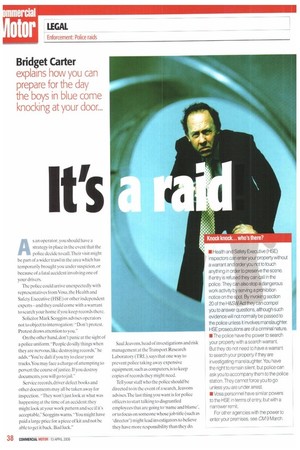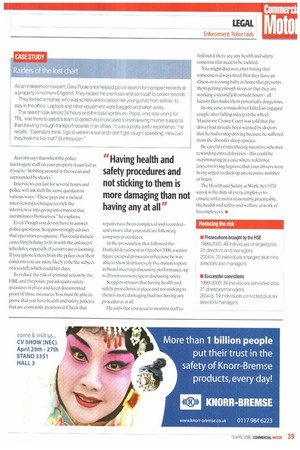t s
Page 38

Page 39

If you've noticed an error in this article please click here to report it so we can fix it.
Bridget Carter
explains how you can prepare for the day the boys in blue come knocking at your door...
As an operator, you should have a strategy in place in the event that the police decide to call,Their visit might be part of a wider trawl in the area which has temporarily brought you under suspicion,or because of a fatal accident involving one of your drivers.
The police could arrive unexpectedly with representatives from Vosa, the Health and Safety Executive (HSE) or other independent expertsand they could come with a warrant to search your home if you keep records there.
Solicitor Mark Scoggins advises operators not to object to interrogation: "Don't protest. Protest draws attention to you."
On the other hand, don't panic at the sight of a police uniform. People do silly things when they are nervous, like destroying records," he adds. "You're daft if you try to clear your tracks. You may face a charge of attempting to pervert the course ofjustice. If you destroy documents,you will go to jail."
Service records, driver defect books and other documents may all he taken away for inspection. "They won't just look at what was happening at the time of an accident:they might look at your work pattern and see if its acceptable," Scoggins warns. You might have paid a large price for apiece of kit and not he able to get it back. Bad luck."
Saul Jeavons, head of investigations and risk management at the Transport Research Laboratory (TRL). says that one way to prevent police taking away expensive equipment, such as computers, is to keep copies of records they might need.
Tell your staff who the police should be directed to in the event of a search, Jeavons advises.The last thing you want is for police officers to start talking to disgruntled employees that are going to 'name and blame', or to focus on someone whose job title (such as 'director') might lead investigators to believe they have more responsibility than they do.
• Health and Safety Executive (HSE) inspectors can enter your property without a warrant and order you not to touch anything in order to preserve the scene. If entry is refused they can call in the police. They can also stop a dangerous work activity by serving a prohibition notice on the spot. By invoking section 20 of the H&SW Act they can compel you to answer questions, although such evidence will not normally be passed to the police unless it involves manslaughter. HSE prosecutions are of a criminal nature.
• The police have the power to search your property with a search warrant. But they do not need to have a warrant to search your property if they are investigating manslaughter. You have the right to remain silent, but police can ask you to accompany them to the police station. They cannot force you to go unless you are under arrest.
• Vasa personnel have similar powers to the HSE in terms of entry, but with a narrower remit.
For other agencies with the power to enter your premises, see CM 9 March. Jeavons says that when the police interrogate staff on your property it can feel as if you're "bobbing around in the ocean and surrounded by sharks".
Interviews can last for several hours and police will ask staff the same question in various ways. "These guys use a tactical interviewing technique to trick the interviewee into giving information that incriminates themselves," he explains.
Even though you do not have to answer police questions, Scoggins strongly advises that operators co-operate. This could include cancelling holiday to lit in with the enforcers' schedules, especially if a court case is looming. If you ignore letters from the police over their concerns you are more likely to be the subject of a search,which could last days.
To reduce the risk of criminal action by the HSE and the police, put adequate safety measures in place and keep documented proof of those measures. You must be able to prove that you have health and safety policies that arc constantly monitored.Check that repairs have been completed and recorded — and ensure that your staff are following company procedures.
In the prosecution that followed the Hatfield derailment in October 2000,a senior figure escaped prosecution because he was able to show that for every five minutes spent in board meetings discussing performance, up to 20 minutes were spent discussing safety.
Scoggins stresses that having health and safety procedures in place and not sticking to them is more damaging than not having any procedures at all.
He adds that you need to monitor staff to find out if there are any health and safety concerns that need to be tackled.
You might discover, after noting that someone is always tired, that they have an illness or a young baby at home that prevents them getting enough sleep. or that they are working a second job outside hours —all factors that make them potentially dangerous.
In one case, a truck driver killed an engaged couple after falling asleep at the wheel. Maidstone Crown Court was told that the driver had already been warned by doctors that he had to stop driving because he suffered from the disorder sleep apnoea.
Be careful of introducing incentive schemes rewarding extra deliveries— this could be incriminating in a case where a defence lawyer is trying to prove that your drivers were being urged to clock up an excessive number of hours.
The Health and Safety at Work Act 1974 says it is the duty of every employer to ensure, so far as it is reasonably practicable. the health and safety and welfare at work of his employees. •
































































































































































































